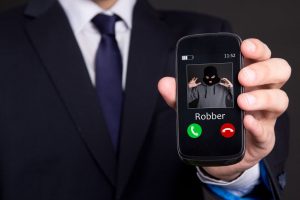 Have you already received any scam call this week? If you haven’t, consider yourself lucky. Because scam calls are on the rise. And scammers are more resourceful than ever before.
Have you already received any scam call this week? If you haven’t, consider yourself lucky. Because scam calls are on the rise. And scammers are more resourceful than ever before.
“It’s easy. Whenever an unknown call comes, I simply don’t answer. Yes, I know that I can miss a job opportunity or another important call because of it. But I just don’t want to risk dealing with a scammer anymore,” says 34-year-old Sandra.
She’s not the only one. Because in 2019, answering a call from unknown numbers is a modern act of heroism. And it will get worse. According to experts, almost half of your incoming phone calls in next months will be from scammers and spammers.
So we did some digging, based on the Should I Answer app’s stats, and made a list of 5 top phone scam you can come across. Here they are.
1. Tax scam
 This maybe looks like a yesterday news. However, scammers don’t give up on trying. The numbers speak for themselves: according to IRS, thousands of people have lost millions of dollars (and their personal information, as well) to tax scams!
This maybe looks like a yesterday news. However, scammers don’t give up on trying. The numbers speak for themselves: according to IRS, thousands of people have lost millions of dollars (and their personal information, as well) to tax scams!
How does it look like?
It usually starts with a simple text message or a call in which you learn a disturbing news. You’ve forgotten to pay your taxes and if you won’t pay it immediately, you’re threatened with arrest and frozen assets.
What you should know?
The real IRS won’t contact you via phone calls or text messages. It usually initiates most contacts through regular mail. The real IRS will call you only under special circumstances – for example when you have an overdue tax bill.
So how to find out if it’s the real IRS, who’s calling? It’s simple. After receiving a tax warning, supposedly from the IRS, call one of the official numbers listed on IRS’s webpage and check out your tax account for yourself.
2. Tech support scam
 This tactics is one of the most effective scam strategies. For three main reasons: it trades on good names of Microsoft or Apple (since scammers usually claim to speak in these companies’ names), it uses scare tactics and it counts on our lack of technical knowledge.
This tactics is one of the most effective scam strategies. For three main reasons: it trades on good names of Microsoft or Apple (since scammers usually claim to speak in these companies’ names), it uses scare tactics and it counts on our lack of technical knowledge.
How does it look like?
Your phone rings, you answer it and then you hear this: a foreign accent, the most probable english name and a warning. As they say, our computer has been compromised and it needs to be fixed immediately. Luckily, the kind guy on the other end of a phone line can help you right away. They just need two things – a remote access to your computer and a payment.
What you should know?
Even if you have already fallen for this trick, you still can save your computer and money. However, you have to act quickly.
First, immediately change the password you use to access your computer. Also, change a password on every account that uses the same password. Second, call your legitimate tech support company and ask them to remove possible malware from your computer. And last, but not least – if you’ve shared your credit card details with a scammer, call your credit card company as soon as possible. Ask to reverse the charges and, just to be sure, check your statements for any charges you didn’t make.
3. Fake FBI scam

What would you do if the real FBI called? You’d probably be scared as never.
Scammers know that. So they’re pretending to be the FBI in hopes of tricking you into giving them your money (and your personal information as well).
How does it look like?
Usually, it all starts with a single text message. It says something like this: “There has been reported a suspicious person in your neighbourhood, don’t you want to buy this cool security system?” Signed: FBI.
Or it could get worse. They call you with a warning: there’s a federal warrant out for your arrest. Which you can avoid by an immediate payment.
What you should know?
The real FBI has nothing to do with these messages or calls. It’s just another trick how to force you to buy, what you don’t need at all. The real FBI clarifies that the agency doesn’t call people to demand money or threaten arrest.
4. Fake bank scam
 What would you do if someone told you your money is at risk? You’d probably freak out. And that’s exactly what scammer are counting on.
What would you do if someone told you your money is at risk? You’d probably freak out. And that’s exactly what scammer are counting on.
How does it look like?
It all starts with a single call. You answer a call from an unknown number and a professional guy on the other end of the line tells you a disturbing news. Your money is at risk. In order to save it, you’re instructed to tell the caller your account and card details, including your PIN number. Sometimes, they even offer to send a courier to collect your card. They may also advise transferring your money to a ‘safe account’ to protect it.
What you should know?
No matter how suspicious it sounds, thousands of people all over the world fall for this tactic every day. Your bank will never ever ask you to tell your credit card details over a phone.
5. Fake charity scam
 In general, though sometimes annoying, these charity calls are not a bad thing. You’re given a chance to donate money for a good cause and, in fact, there are a lot of charitable organizations that use your donations to make a real difference in the world. However, your generosity can backfire on you.
In general, though sometimes annoying, these charity calls are not a bad thing. You’re given a chance to donate money for a good cause and, in fact, there are a lot of charitable organizations that use your donations to make a real difference in the world. However, your generosity can backfire on you.
How does it look like?
Usually, scammers pose as either agents of legitimate well-known charities or create their own charity name. This can include charities that conduct medical research or support disease sufferers and their families. They may also pose as individuals needing donations for health or other reasons.
What you should know?
When considering donating to a certain charity, check it out online. Go to CharityNavigator site and look up the charity you’ve spoken to. By the way: every US charity has a registration number. Ask for it to check it online later. And whenever the caller uses a guilt tactics, just hang up. A legitimate charity will never force you to donate like this.
–> Read more: Charity scam – a complex problem
Protect yourself against all kinds of scam. Get the new and improved Should I Answer app. The Should I Answer app is based on a community spam database (there are 30 000 new reports daily!), so it can block all incoming spam calls for you. It’s also perfectly safe: your data and personal information never leave your phone.